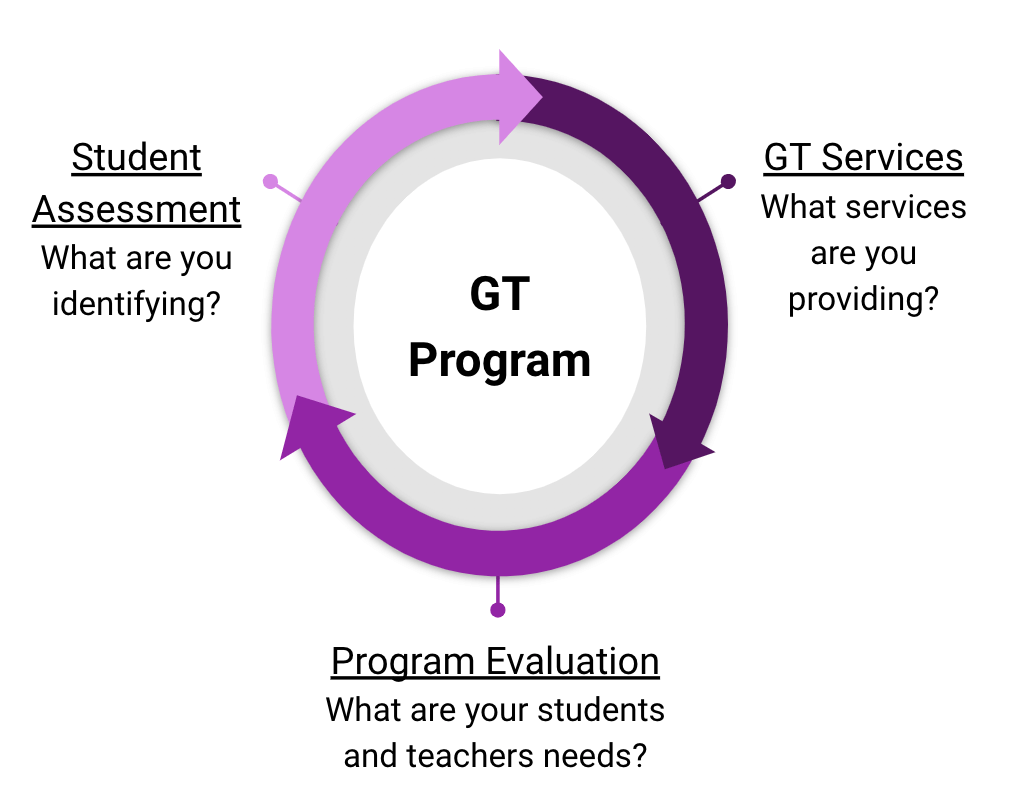Gifted and Talented (GT) Programs vary across campuses, districts, and the state. Do you know your gifted and talented program goals? Are you meeting these goals? How do you measure the success of your GT Program? How do you communicate goals and successes to your teaching, family, and student communities? Let’s discuss these questions and answers.
I have noticed that when leaders gather to discuss the success of local GT programs they often start telling you about the measures of growth within their program as evidenced by students, staff, and sometimes data. Rarely do leaders talk about what is, in my opinion, the most important factor for success: the goal of the program. Goals provide a school and community a clear message about what is important in your GT Program. You have to define what is important before you can measure your success in achieving that goal.
TEA’s State GT Goal
TEA developed a state goal for GT services that states:
“Students who participate in services designed for gifted/talented students will demonstrate skills in self-directed learning, thinking, research, and communication as evidenced by the development of innovative products and performances that reflect individuality and creativity and are advanced in relation to students of similar age, experience, or environment. High school graduates who have participated in services for gifted/talented students will have produced products and performances of professional quality as part of their program services.”
Texas State Plan for the Education of Gifted and Talented Students, 2019
When you consider the message of this goal, there are a few things that stand out as important to the state of Texas:
- Students should demonstrate specific skills: self-directed learning, thinking, research, and communication.
- Students should be provided with the opportunity to demonstrate their knowledge through the development of products and performances.
This goal is the driving force for the standards of the Texas State Plan. These standards outline all factors that have to be in place in order to build a GT program in the state of Texas. Often this goal is so broad that it doesn’t match the unique needs of your local school community. In order for your program to be culturally relevant, you must develop a local program goal.
Local GT Program Goals
What is the goal of your local program…
- In relation to student assessment, what student qualities are identified as program services qualifiers?
- In relation to services and curriculum, what are your students learning and how are they learning?
- In relation to program evaluations, what are students’ and teachers’ needs, and are they being met?

The Texas State Plan requires that you gather parent and community input for your GT program. Include these stakeholders’ voices in your goal-setting process! You already know what the state requires. When you create a local goal, you need to include what your local community values.
You have to clearly understand what your goals are before you can measure program success or failure. The goals are what your program defines as program accountability to the state and your local community. They are what will ultimately determine if you are meeting the needs of your gifted and talented students.
Defining Goals
Does your district already have GT Program goals defined? Schedule collaborative time with various stakeholders to review your goals compared to the state plan and district implementation practice. Are you in need of GT Program goals? Start with the suggestions in this article.
Are you a Gifted and Talented leader in your district? ESC Region 13 Gifted and Talented offers many Gifted and Talented training opportunities. These workshops will support you with specific areas of the GT program, including program evaluation.
For more information on the GT program at ESC Region 13 or to sign up for the latest news, visit our webpage.
Amber Reinecke is the Cross-Curricular Systems Program Manager and Gifted and Talented (GT) Specialist at ESC Region 13. She has experience as an elementary classroom GT teacher, as well as six years of experience as a Gifted and Talented Pull-out Teacher and Instructional Coach. She has a passion for working with the gifted community in order to advocate for student needs.






Add comment